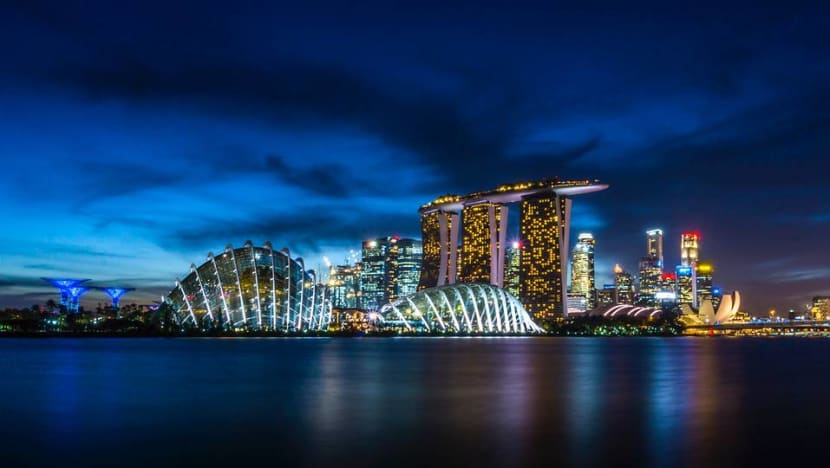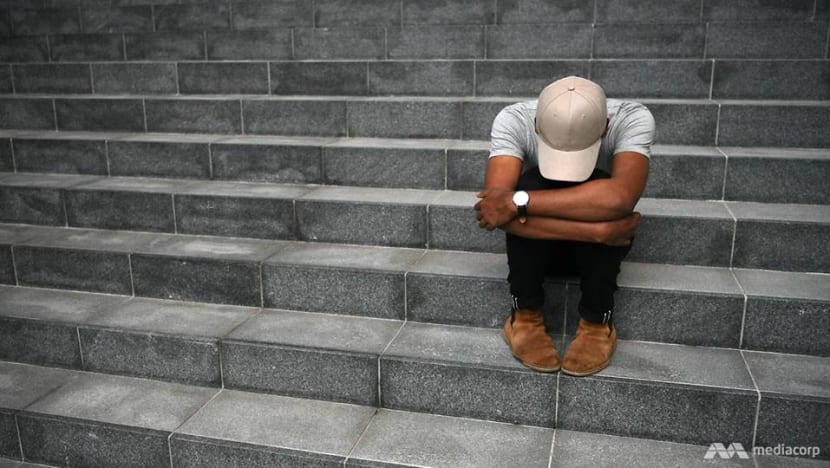commentary Commentary
Commentary: We declare a goal of ending mental health stigma yet viciously mock the woman at Shunfu Market
A viral video of a man mocking the woman who yelled ‘I’m a sovereign’ at Shunfu market suggests we are not walking the talk when it comes to mental health, says NMP Anthea Ong.

The woman is seen arguing with people in videos circulating online.
SINGAPORE: At 8pm on Thursday (May 7), 33 key Singapore landmarks across the island lit up in blue as part of the global campaign #SeeItBlue.
It was a heartening sight to see action taken to highlight the importance of mental well-being during this difficult period of COVID-19 and raise awareness for mental health.
The nationwide light show will run every Thursday at 8pm until the end of the circuit breaker on Jun 1, as a display of solidarity.
Yet, just the day before, a musical video on YouTube made by a local artist went viral, mocking the unmasked woman in Shunfu who uttered the word “sovereign” when asked why she wasn’t wearing one.
No one would disagree the woman should be taken to task for posing a threat to public health and breaching coronavirus restrictions. Swift action was taken. She was charged just two days after the incident on one count of being a nuisance and three counts of violating the COVID-19 (Temporary Measures) rules.

But where the court had decided she should be remanded at the Institute of Mental Health to assess if she is fit to plea, the video made by the artist and the praises heaped by scores of people who shared it widely on social media now sit awkwardly.
If anything, it speaks volume of the prejudice and ignorance of mental health we still have as a society.
SINGAPORE WANTS TO END THE STIGMA OF MENTAL ILLNESS
“End the stigma of mental illness” is a phrase we have heard numerous times in recent years as Singapore awakens to the discrimination and disadvantages people with mental health conditions face.
Underlying problematic public attitudes have been exposed by surveys conducted by the National Council of Social Services (NCSS).
We have made big strides to tackle mental health at the national level. An anti-mental health stigma campaign Beyond the Label was launched by NCSS in 2018 to combat these sentiments.
Prominent figures have come forward to lend their voice. Speaker of Parliament Tan Chuan Jin addressed this issue at the Beyond the Label Fest in September last year.
READ: Commentary: Singaporeans more adaptable than they give themselves credit for
READ: Commentary: Will you hire and retain persons with mental health conditions?
Singapore was also the first country in Asia to host the Together Against Stigma Global Conference in October 2019 where President Halimah Yacob stressed more must be done to support those with mental health issues.
Negative attitudes towards mental health conditions are "sad" and reflect a "gross ignorance about what this illness is all about", she had said.
BUT IS SINGAPORE WALKING THE TALK?
The word stigma means a mark of shame. In the mental health sector, this typically refers to the unfair mark of shame others assigned to those who live with different mental health conditions.
There’s also self-stigma, the shame people with such conditions assign to themselves when they feel there’s something “wrong” with how their brains work.
This goal of “ending the stigma” may only be scratching the surface of the real shame, acts of discrimination and microaggressions people who live with mental conditions still face on a daily basis.

Yet circle back to the YouTube video, which ridiculed the woman with words like “lunatic”, “thick in the head” and “crazy”, and you cannot help but go away with the sense that this is the type of bigotry that perpetuates misguided perceptions and peddles the narrative that those with poor mental health are "crazy people" who act out.
This is sadly turning the other way from our national vision of going beyond the label endorsed by our leaders and Singaporeans.
THE FEAR AND ANXIETY
Those who live with mental health conditions have expressed their fear and anxiety regarding this insensitive act of public shaming, made many times worse by the complicit chorus of compliments to the talent and entertainment value of this public shaming.
One of them shared with me: “If I ever had a public breakdown, I would be absolutely mortified if my episode was plastered all over social media, and turned into fodder for further public amusement by an artist.”
Another also shared with me in anguish: “This perpetuates a false association between mental health and social irresponsibility/deviancy ... It has justified public shaming of mental health as fair game, and even as a kind of moral righteousness.”
READ: Commentary: Working together towards a zero-suicide Singapore
READ: Commentary: Our approach to mental health needs to change. COVID-19 will force us to
COVID-19 IS ALSO A MENTAL HEALTH CRISIS
The COVID-19 crisis has turned every aspect of normal life upside down with strict safe distancing and circuit breaker measures to protect life.
With no end in sight, the mental health consequences of COVID-19 are starting to manifest – fuelled by the devastating mix of uncertainty, isolation, grief and economic despair.
We cannot pretend to know how these consequences will manifest in each individual, including those with no pre-existing mental health conditions.
Spending time in isolation and following safe distancing measures may slow the spread of the disease, but it may also be linked to an increase in depression, anxiety, drug and alcohol abuse, domestic violence and child abuse, according to many recent studies including the highly-regarded journal The Lancet Report.
READ: Commentary: Isolated with your abuser? Why family violence seems to be on the rise during COVID-19 outbreak
READ: COVID-19 situation throws into stark relief what victims of domestic abuse face
We think of the coronavirus as a physical health threat but forget this is also a mental health crisis needing attention, a concern I have raised repeatedly in Parliament recently, given that one in seven of Singaporeans already live with a mental health condition before COVID-19.
THE STORIES WE DON’T HEAR
We have underestimated the silent toll on our mental health COVID-19 is taking on us because such stories have remained behind closed doors for fear of stigma.
A senior business leader recently shared her mounting mental and emotional struggles with having to support her young children with their home-based learning (and now on holiday) as well as her employees with their own challenges remotely.
An acquaintance almost killed himself after losing all gigs as an event emcee some weeks back, while he could not have his weekly sessions with his therapist until recently.
A 20-year-old man hung himself in his room in mid-April due to challenging family circumstances.
A 15-year-old marriage is now on the brink of a complete breakdown just five weeks into the circuit breaker.

READ: Commentary: This circuit breaker is making us yearn for human interaction more
These are just but a small sample of stories of mental struggles I have come to know of personally.
WALK THE TALK
Even before the pandemic, two-thirds of adults with mental health conditions did not seek treatment in Singapore, according to the NCSS Public Attitudes Survey in 2017. Public shaming will exacerbate poor mental health for those already struggling.
Experts have long cautioned against public shaming, warning that it can have a lasting and negative psychological impact on those who are singled out.
At first glance, we might fall into the trap of thinking being shamed on social media is an experience anyone can easily shrug off and recover from. However, many who have been the target of Internet shaming face lasting and damaging consequences.
The mental health curve from COVID-19 is going to have a very long tail. So leave errant individuals to the authorities, that’s the rule of law order that we are proud of.
Let’s channel our influence, talents and energies during this trying time towards looking out for each other, and our mental well-being - and not perpetuate the stigmatisation of mental health.
We must go beyond merely a display of solidarity to truly walk the talk of empathy and inclusion when the next sea of blue light shines from our gleaming skyscrapers.
LISTEN: COVID-19: Aviation and flying never ever the same again
BOOKMARK THIS: Our comprehensive coverage of the coronavirus outbreak and its developments
Download our app or subscribe to our Telegram channel for the latest updates on the coronavirus outbreak: https://cna.asia/telegram
Anthea Ong is a Nominated Member of Parliament, a social entrepreneur (founder of Hush TeaBar, A Good Space, WorkWell Leaders Workgroup), leadership coach and author of 50 Shades of Love.
The National CARE Hotline provides emotional and psychological support for all who are impacted by the COVID-19 pandemic and is manned 24/7 by trained volunteers. If you need someone to talk to, please call the Hotline at 1800-202-6868














